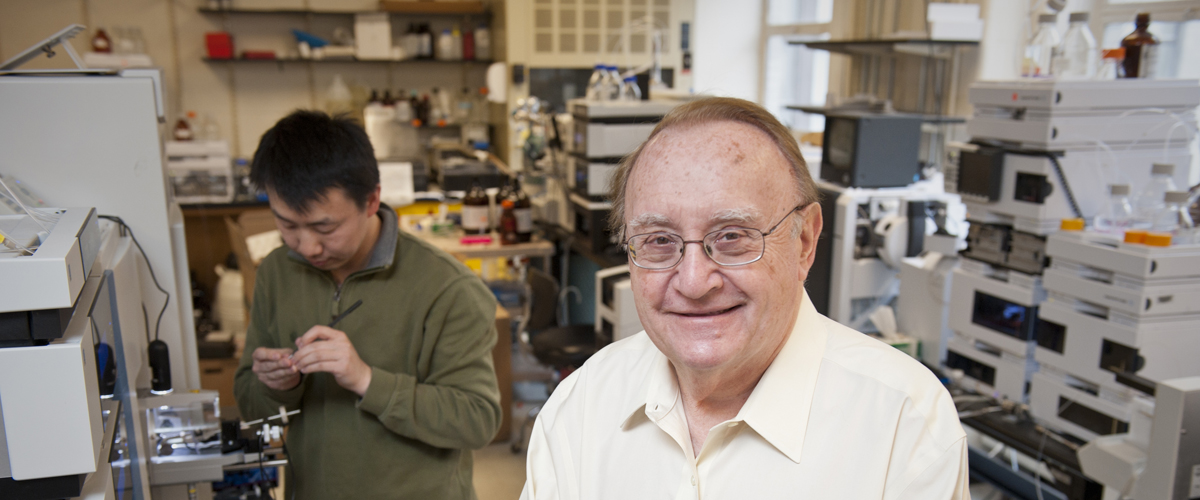by Angela Herring
A quarter century ago, Barry Karger and his team published research in the journal Proceedings of the National Academy of Sciences that would help enable scientists to sequence the human genome. It marked the first time anyone had shown a reliable and high-resolution analytical technique for characterizing DNA molecules.
“And if you don’t know what the molecule is, you can’t get very far,” said Karger, the James L. Waters Chair in Analytical Chemistry at Northeastern and the founding director of the university’s Barnett Institute of Chemical and Biological Analysis.
Karger’s method took an existing technology—capillary electrophoresis—to new heights. For this achievement, along with a lifetime of contributions to the field, Karger was honored Sunday as the third-ever recipient of the Arnold O. Beckman Medal and Award for Outstanding Scientific Achievements in the Field of Electrodriven Separation Techniques. He received the award at the 30th International Symposium on Microscale Bioseparation, held in Hungary on April 27-May 1.
The award honors the legacy of Arnold O. Beckman, an American chemist who invented the pH meter and other important analytical chemistry technologies. Receiving the award brought Karger back to his roots; he founded the conference series around the same time as the publication of his breakthrough research paper. At that time the series was called High Performance Capillary Electrophoresis, which Karger organized for a decade. It has since expanded into the world’s largest international gathering of the electro-separation research community.
Karger’s novel capillary electrophoresis method was used to sequence 40 percent of the human genome. After completing that project in 2003, he pivoted in his research to focus on liquid chromatography and mass spectrometry to investigate proteins. Some of his work, which has been focused on clinical and biotechnical challenges, has lead to important discoveries for the diagnosis of breast cancer and other diseases. He also has made significant contributions to the biotechnology industry.
Karger’s 50-year career—which is still quite active—has been supported by the simple fact that he gets bored easily, as he put it. “That means you don’t get bogged down, you’re not afraid to go into new areas,” he explained. So even after the founding of an internationally recognized research center 40 years ago, watching nearly 400 scholars pass through its doors, and making major contributions to a number of different fields, Karger is still learning new things.
For instance, only now have the technologies come far enough for him to be able to combine two of his most beloved—capillary electrophoresis and mass spectrometry. This will allow his team to look at full intact proteins rather than just peptides, or pieces of the protein. And since, as he said, “it’s the protein that does the function, not the peptide,” such a method could yield yet another major breakthrough.
Upon receiving the award, Karger presented a lecture titled, “Fifty years in separation science and the future.” In his talk, he discussed the elements that he believes make for successful science: a multi-faceted understanding of the problem at hand, a willingness to look at it in an integrative way, and the ability to collaborate with colleagues across disciplines and with industry partners.
“In the technology, things are moving so fast, so you have to do this,” he said.
Originally published in news@Northeastern on April 28, 2014.

